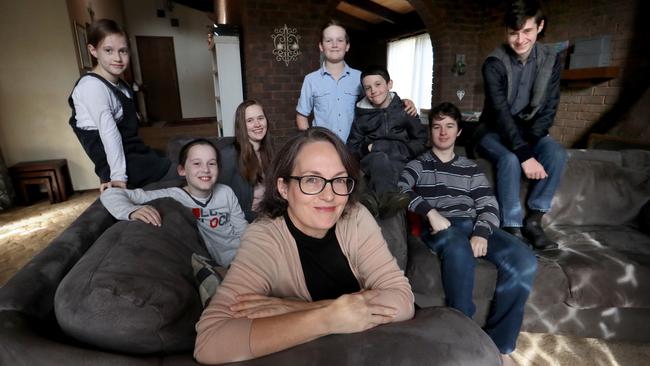Mum of 13 Kathleen Clubb takes pro-life fight to High Court
Pro-lifer Kathleen Clubb is taking her abortion protest stance to the High Court.

Kathleen Clubb is a single mother of 13 children, all of whom have been homeschooled.
The family attends Latin Mass on Sundays, bouncing their way to church in a van with pro-life bumper stickers on the back, and yes, she knows exactly what people are thinking when she pulls up next to them at the lights.
Nutter. Religious nutter.
Mrs Clubb would quite naturally disagree. “I think I’m a sensible person,” she says, laughing softly while cradling a mug of tea in her home on the bushy Melbourne fringe.
Yes, she is an orthodox Catholic, opposed to abortion, suicide, euthanasia, IVF, surrogacy and divorce, whose marriage was annulled. But more importantly, she believes in her right to express her opinion about these matters.
“I don’t see how speaking up makes me a threat to the community,” she says.
And yet here she sits, newly badged as a criminal. Mrs Clubb, 52, last year became the first person charged under a Victorian law designed to stop the decade-long protests outside abortion clinics. She was pleased to be arrested, because she can now appeal all the way to the High Court against her conviction for protesting against abortion. “For me, it’s a free-speech matter,” she says.
As every first-year law student knows, Australia has no bill of rights, no first amendment, no constitutional right to free speech. However, in 1992 the High Court did recognise what it called an “implied freedom of political communication”.
It’s a tricky concept, in that the freedom is not a right granted to each of us as individuals, so much as a burden on the parliament, meaning it can’t pass laws that limit that freedom.
Mrs Clubb’s lawyers will argue that the law that prevents her from protesting outside an abortion clinic violates that freedom, with implications for all protesters, and freethinkers, everywhere.
She will be opposed in court by: Victorian solicitor-general Kristen Walker, commonwealth solicitor-general Stephen Donaghue QC, NSW solicitor-general Michael Sexton SC, Queensland solicitor-general Peter Dunning QC, West Australian solicitor-general Peter Quinlan SC, South Australian solicitor-general Chris Bleby SC, and barristers acting for private abortion providers, who seek to be heard as amicus curiae (a friend of the court).
Mrs Clubb’s supporters include: “the Helpers” — largely Catholic and wholly anonymous, without so much as a website; the Human Rights Law Alliance, which is hoping to raise an estimated $120,000 to cover the cost of being heard in the High Court; and the Australian Christian Lobby.
In Mrs Clubb’s view, abortion protests outside clinics are no different from protests at sites of proposed dams in Tasmania; no different from the waterfront blockade; no different from uranium mine or coal-seam gas protests; no different from the Eureka Stockade.
“Australian history is replete with examples of political communications being effective because they are conducted at the place where the issue is viscerally felt,” says her legal team, in its submission to the High Court.
Mrs Clubb says: “The point is, if I can be stopped from having my say, anyone can.”
She agrees that abortion protests are confronting, and to some people highly offensive.
But her submission argues: “In order to rouse, political speech must first excite … Sir Robert Menzies’ forgotten people speech, Paul Keating’s Redfern speech, Kevin Rudd’s apology, each was apt to cause discomfort.”
The fact that Mrs Clubb’s views are unpopular likewise strengthens her resolve: it’s unpopular, minority speech that we need to protect, more than majority opinion.





To join the conversation, please log in. Don't have an account? Register
Join the conversation, you are commenting as Logout